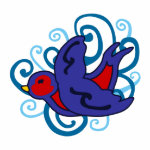I went to a parent discussion recently where the moderator talked about how kids' "sphere of influence" expands as they mature. Even through adolescence, parents remain major players in how a child sees him/herself and the world -- but peers matter more and more.
When
ADHD is in the picture, this process can be tricky...but rewarding, too. I wanted to know how
kids with ADHD can support each other, and Rob Himburg -- director of education at the
Leelanau School in Michigan, where he also collaborates with
Ned Hallowell, M.D., on a weeklong
summer enrichment camp for kids with ADHD and their parents -- seemed like the perfect person to ask. Here's what he's seen:
When brought together, kids with ADHD connect in a matter of "minutes." Himburg, who works with kids in the summer program while Dr. Hallowell engages their parents, says he can predict the affiliations instantly: "Those four boys are gonna end up building things together in the woods. Those older boys will talk about the music they're into. Those girls will draw together on our breaks."
Just being together is therapeutic for the kids (and, by extension, their parents). "Every year on about the second morning, a mom or dad comes in and says, "'It's already been worth it. My [child] is saying, I can't believe there are other kids just like me.'"
In academic situations, peer support grows from awareness of self and others. Group work, says Himburg, is "maybe one of the most difficult things we ask" of students at Leelanau, which customizes a rigorous college-prep curriculum to different learning styles. But it pays off in stronger empathy and problem solving, he says. When students know their strengths and others', it "helps create a balance" in the group. "The kids are able to decide 'okay, you take notes; you're the idea guy; and you're a great speaker, so you're definitely doing the presentation...'"
Kids with ADHD benefit from caring "typical" friends. Peers without ADHD can bring out the best in their attention-challenged friends by understanding that ADHD has "nothing to do with intelligence," says Himburg; by appreciating strengths ("maybe that friend with ADHD isn't the strongest in math class, but he's the school champion at tree climbing"); by being patient with typical ADHD behaviors like fidgeting, impulsiveness, zoning out, etc.; and, sometimes, through constructive criticism: "A good friend will learn how to say, 'You know that thing you do? People don't seem to like that.'"
Done well, support-type groups for kids with ADHD can be valuable. In his previous work at the Bay-area
Charles Armstrong School, Himburg enlisted 6th through 8th grade students in mentoring 2nd through 4th graders. The kids spent lunches together doing service projects, enjoying books (with older students reading aloud), etc. When younger kids started talking about playground challenges, "the older kids asked if they could help out," says Himburg. "So we rotated them through recess, and they became like on-field 'coaches' for fun games. They also brought simple problem-solving tactics -- like the 'do-over' concept when two kids disagree -- that they could demonstrate better than adults."
So there you go. Given the right conditions,
leadership jumps onto the rich list of assets kids with ADHD can use to help other kids. Says Himburg, "Sometimes you just need to get out of their way."








